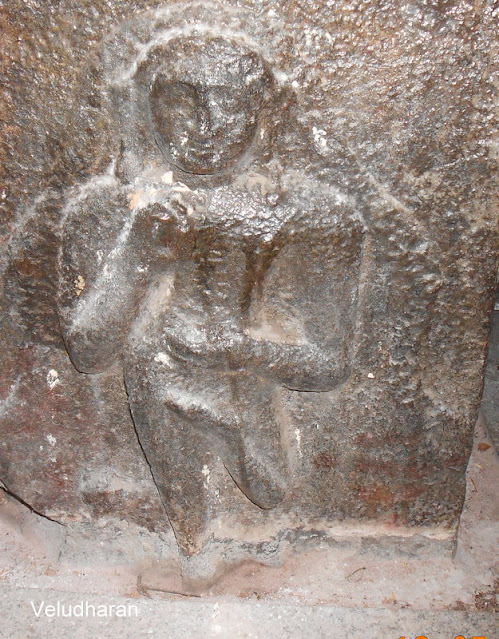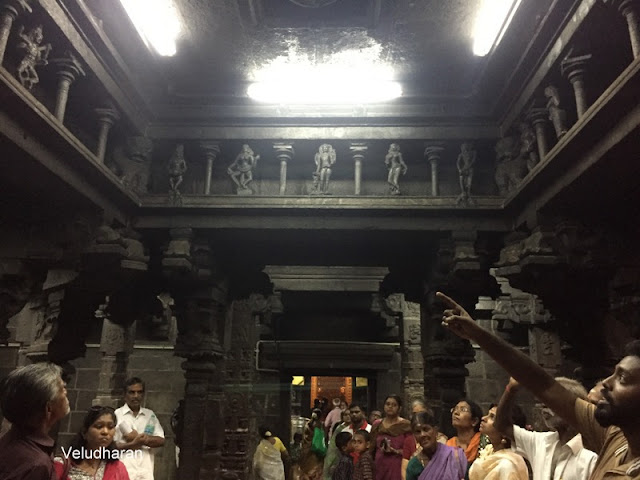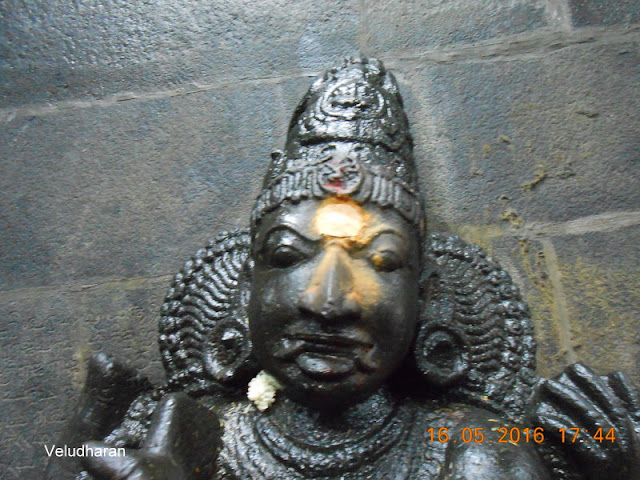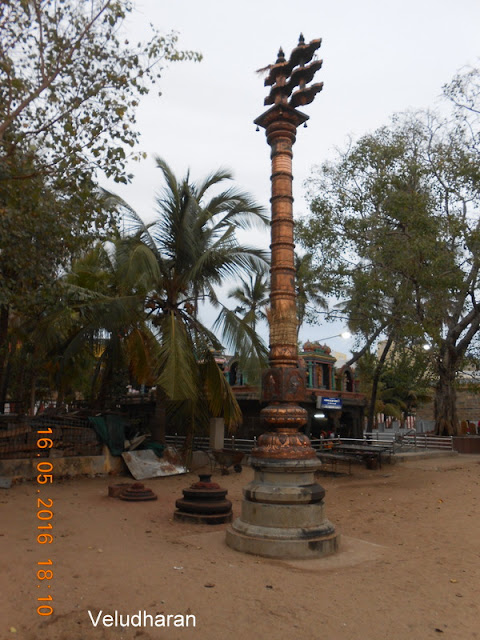17th May 2016
A temple walk around Thiruvottiyur Thyagaraja Swamy temple (Popularly known as Sri Vadivudai Amman Temple) was planned at 3.45 PM on 16th
May 2016 (since the temple reopens at 4 pm). It will include discussions on the Thyagaraja cult, Nayanmars, and Thiruvotriyur, and similarities between
Thiruvarur and Thiruvottiyur based on the Thyagaraja cult.
Even though I had been to this temple many times,
this visit was from a different perspective. The walk was led by Mr. Madhusudhanan, an architect by profession with a passion for temple architecture.
He had done a wonderful presentation of the temple and explained all the
details of the place where changes were made. I really wonder how he could
collect the details in the midst of his professional work. It will be
difficult for me to recollect many things that I said during the
discussion.
The Thyagaraja cult is a set of characteristic features, norms to
be followed, and similarities in the way it was practiced. Most of the
Vidanga sthalangal in and around Thiruvarur practiced a similar cult. There
are some Shiva temples on the Coromandel coast, which have Thyagaraja Sannadhi,
but Vidanga Murti (of a rare gem) is missing. Somaskanda is generally
called Thyagaraja, Thyagaraja, and the secret (covering Kanda in the middle by the flowers, sometimes without Kanda) is of a family tradition type of Murtis, they are Somaskandar, where Murugan will be in the middle and
Ganesha Anugraha Murthy, in which Ganesha is seated on the right side of Lord
Shiva. Both of the stucco Murtis are available on the 2nd level
of the east side of Rajagopuram. The original Vindangar was worshiped by Sri
Mahavishnu, who kept it on his chest. The Vidanga murti was transferred to the Chozha King Musukundha Chakravarthy through Indran. (Which has a
separate story). Similarly, the natanam is also different in each temple.
1
|
Thiruvarur
|
Vidhividangar
|
Ajaba Natanam
|
Depends on the
chest movement due to breathing ( Maha
Vishnu)
|
2
|
Nagaikaronam
|
Sundara Vidangar
|
Vici Natanam
|
Dancing like a sea wave
|
3
|
Thirukolili
|
Avani Vidangar
|
Drunganatanam
|
Dancing like a
bee that hovers on the flowers
|
4
|
Thirunallaru
|
Nagara Vidangar
|
Unmatha Natanam
|
Dancing like an
intoxicated person
|
5
|
Thirukkaarayil
|
Adhi Vidangar
|
Kukkuta Natanam
|
Dancing like a
cock
|
6
|
Thiruvaimur
|
Nalla Vidangar
|
Kamalanatanam
|
Dancing like
lotus moves due to the breeze
|
7
|
Thirumaraikadu
|
Buvanividangar
|
Hamsapadanatanam
|
Dancing with
the gait of a swan
|
The
Thiruvottiyur temples have the contributions of the Chozha, Pallavas, Nayaks, etc. The Thyagaraja sannidhi at Thiruvotriyur was built adjacent to the main Chozha
period temple without much damage to the kodungai. The mandapam was
built in stages by different kings. The Thiagarajar Sannadhi pillars are round with a lot of inscriptions, and the front mandapam is square in shape with reliefs on all sides. The reliefs signify
the different forms/schools of worship like Thanthirka, Kabalika, etc.
A
newcomer to this temple will be very confused by seeing the layout of the
temple. Sannadhis were built randomly, and Murtis were located in
different positions. The Dwarapalakas are beautiful and miniature representations of
Shiva’s dance, and the Gajasamkaramurti chiseled on the cap is worth seeing. The Dwarapalakas might have been originally in the inner praharam and later shifted to the present place, which obstructs the view of the inscriptions. The mandapa pillars have the reliefs of Nayanmar’s siddhu (Sundarar – at Avinashi, the child came out of the croc’s mouth, and
Thirugnanasambandar – Poompavai comes alive from ashes). Also, the sacrificing
reliefs with a head and two ladies holding a trishul.
There
is a Chandeswarar idol kept in the mandapa, which is not in its original
place. In the Nayanmars' place, a boothagana’s moortham is named Nambiyandar Nambi. Then comes the vattaparai Amman Sannadi. This might be of Kannaki
worship. To prove this during the function, the pandal erected outside will
not be removed but instead burnt out. Also, there is a possibility that Vattaparai
Amman might be a Village god with an anthill nearby (Moolavar Lord Shiva is in
the form of an Anthill), and the construction of the Vattaparai Amman
sannidhi, which has no space with the main sanctum. There is a Dwajasthambam
installed in front of Vattaparai Amman Sannidhi with its base in a round shape.
This might have been a Trishul once.
After
that, we visited the Thiruvoteesar Temple, which is the main contribution
of Nattukottai Nagarathars. Chandikeswarar and Bhairavar reliefs are in their actual
place on the pillars. The medallions are just as modern as flowers and
Subramanya standing on a lotus. Then comes the Bhairavar Sannidhi
whose hair touches the ground, and the dog is missing.
In
the Vadivudai Amman sannidhi, we see a Murti of Chamundi with a skull on
its head. There must be a Saptamatrikas sannidhi previously. This is the
one that escaped from... and was installed here. It is interesting to note that Adi Sankara worshiped Sri Vadivudai Amman. To prove this, Pooja is still being conducted
by the Malayalis.
LOCATION OF THE TEMPLE: CLICK
HERE
The
Voice of Madhusudhanan: CLICK
HERE
Thiagarajar sannadhi was built with the main sannadhi
without damaging the kodungai
Thanthirika worship
Kabalika
worship (holding the spinal cord bone)
Thabas - standing on one leg
Sundarar and
the child come out of the crocodile’s mouth
Thirugnanasambandar and Poompavai
Sacrifice
Homa
mandapam where Murtis are on the top
Chandikeswarar
in the front mandapam
A
miniature Shiva’s dance on the cap of Dwarapala
A
miniature Shiva’s dance on the cap of Dwarapalaka
A
1963 beautiful painting of Kaliya Nayanar trying to cut himself to get blood to burn a light in the sanctum, where
Lord Shiva appeared and blessed him
The
round pillar with inscriptions of Rajaraja-I’s meikeerthi – back of sanctum
Sri Kowleeswarar back of Sri Thiagarajar
Sannadhi
Dwajasthambam with a circular base in front of
Vattaparai Amman Sannadhi
Subramaniyar
on Lotus
Bairavar sannidhi
Chamundi – in Vadivudai Amman Temple
---OM
SHIVAYA NAMA---



















































